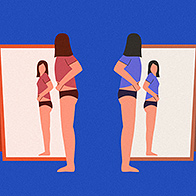Prevent the Resurgence of a Seasonal Eating Disorder This Summer

Like a shark lurking in shallow water, old eating disorder triggers can reappear in the summer as swimsuit season puts body insecurities on high alert.
Some people may prefer the hotter-than-Hades season, with plentiful opportunities for barely clothed fun in the sun. However, for people with current or former eating disorders, summer socialization can feel like actual hell on Earth.
Eating disorders—bulimia nervosa, anorexia nervosa, binge eating disorder—are serious mental health conditions that can affect a person's relationships, libido, fertility, employment prospects and overall longevity.
While eating disorders can strike at any time, people with a history of disordered eating may find summer to be particularly grueling. But with a few helpful tips, experts say people susceptible to eating disorders can arm themselves with the necessary tools to stay afloat year-round.
Why is summer such a triggering time of year?
We spoke to three experts about the various factors that can act as triggers for eating disorders, and especially the common reasons the season is detrimental to those most vulnerable.
First are the sociocultural influences. Look no further than social media to find one driver of America's summertime beach body obsession. Scientific studies suggest societal pressures to attain a certain body shape or size during summer months can contribute to the development or exacerbation of eating disorders.
Look no further than social media to find one driver of America's summertime beach body obsession.
"If you look at our society at large, and the messages we are sent about good or bad food—what is a healthy or unhealthy body size, weight or shape, what is attractive or isn't attractive—we're all inundated by these messages and affected by them in some way, shape or form," said Elizabeth Easton, Psy.D., a certified eating disorder specialist (CEDS) and the national director of psychotherapy at Eating Recovery Center in Denver.
These pressures, often further fueled by social media platforms, may lead individuals to engage in unhealthy dieting practices or extreme exercise routines.
Daily routines are disrupted by the season
Whether it's vacations or school schedule changes, summer disruptions can upend established healthy eating patterns and increase the risk of disordered eating behaviors. The summer season, especially, combined with the typical stressors of adulthood, can further exacerbate disordered eating patterns.
"For adults, you see it when they're getting their first job, moving out of their family's house, getting married, having children, divorces, loss of loved ones," Easton said. "These times when anyone would feel distressed and overwhelmed because of transition and change. That's when the [eating disorder] symptoms can become a way to manage the stress."
She added that eating disorders can similarly arise in children as they transition from middle school to high school, high school to college and college to the workforce.
"It's just a sense of being out of their typical structure or routine that tends to heighten the anxiety that runs underneath or in conjunction with eating disorders," she said.
The pressures of our diet culture
Despite the rising popularity of the "body positivity" movement, America's summertime marketing and advertising campaigns continue to be notorious for the proliferation of fad diets and fat shaming. It's no wonder individuals predisposed to eating disorders may resort to restrictive eating plans in an attempt to achieve a desired body shape for the summer.
"We always say: 'Everybody is a beach body,'" said Elizabet Altunkara, L.M.S.W., the New York City-based director of education at the National Eating Disorders Association, the largest nonprofit dedicated to the illness. "That's really something that's created by the diet culture and is really detrimental to anyone, but especially those who are in recovery."
Research indicates exposure to diet culture and engagement in fad diets can lead to disordered eating behaviors and an increased risk of developing an eating disorder.
Rising temperatures and body image concerns
The summer heat can intensify body image concerns, particularly for people struggling with body dysmorphia, a mental illness that involves an obsessive focus on your own perception of a flaw in your appearance. The pressure to wear revealing clothing or swimsuits may heighten distress and trigger disordered eating behaviors as individuals strive to achieve an idealized body image.
Body dissatisfaction is a significant risk factor for the development of eating disorders. Constant exposure to carefully curated images of "perfect" bodies can lead to negative self-comparisons, which may contribute to the onset or exacerbation of eating disorders.
During the summer, individuals may experience heightened body dissatisfaction due to increased exposure and comparison to others, particularly on social media.
How to prepare for the summer season
Experts recommend that individuals susceptible to eating disorders prepare themselves for the onslaught of eating disorder triggers that may lay ahead this summer by doing a few things:
- Know your personal eating disorder triggers.
- Identify a group of supportive people you can lean on.
- Practice mindfulness techniques.
As summer heats up, you should remember a person's reaction to the problem is often more important than whatever initially sparked the disordered eating, according to Thea Gallagher, Psy.D., a clinical assistant professor at New York University (NYU) Grossman School of Medicine and host of NYULangone Health's podcast, "Insights on Psychiatry."
"Summer can also be a really good time. As long as people are connected with a therapist, they can really understand how to manage those triggers," Gallagher said. "A good or bad week isn't really based on how triggered we get, it's based on what we do about it."
Identify and notify your support circle
As with any serious illness, it is vital for the people you love to be there for you in your time of need. Altunkara noted that a person's support system is "crucial" to their ability to fully recover from an eating disorder.
"It's really important to lean on and know who your support people are, and to have open communication with them about your needs," she added.
"Let people know that you're struggling," Easton said. "It's incredibly difficult to talk about this stuff, but nobody gets better in isolation. That's why we saw such high numbers of this during the pandemic—because people were in isolation, and they were not as connected and they did not have as much of an opportunity to feel seen in their pain and what they were struggling with."
Hit pause on social media
Just as someone with a history of drug addiction needs to be discerning about what they consume on social media, so, too, must those with disordered eating habits.
"We can't say social media or media, in general, creates eating disorders, or anxiety disorders," Easton said. "But it certainly can foster these messages that are unhealthy, that are very black and white, saying that this is what you should aspire to and what your body should look like."
Experts agreed that the summer season may be the perfect time to take an intentional break from social media platforms. If a total social media break is out of the question, try to influence your algorithm to feature more body-positive content, or swap virtual socialization for in-person, face-to-face interactions with friends and family only.
"I think it's really important to curate your social media and to manage the amount of time you spend on it," Gallagher said. "It's not that you have to live in a world without triggers, but you don't necessarily have to engage with that content."
Wear what makes you feel comfortable
Barely there fashion isn't for everyone. Regardless of what's considered in style, experts said individuals should wear clothing that enhances their confidence, rather than what detracts from it.
"Just wear comfortable clothes," Altunkara said. "Wear whatever you feel comfortable in. And try to resist those cultural ideals of whatever you have to be wearing. Just reject those ideas that diet culture is trying to dictate to us. That's one of the things we're trying to encourage people to do."
Practice mindfulness
If your mind seems to be returning to thoughts of disordered eating, give mindfulness a try.
"Thought-stopping doesn't work. You can't stop the thoughts. But you don't have to engage with them," Gallagher said. "You don't have to pick up the tennis racket and get into a back and forth with them. You can engage with other things that are right in front of you. That's what the practice of mindfulness is. So if you're at the beach with friends, enjoying conversation, swimming, playing a game, enjoying music, actually allowing yourself to focus on things that are external to how you're thinking or viewing your own body, shape or weight."
Using breathing techniques or simply redirecting negative thoughts could have lasting positive effects on an individual's psychological state. Gallagher suggested those struggling with disordered thoughts try asking themselves, "What would I rather be thinking about?" or "What would I rather be focusing on?" Doing so can bring healthier goals back to the forefront of the mind.
"Again, I think it's about really appreciating your body for the things that it does and not just the way that it looks and if it's acceptable in society or not," she said.
Seek treatment
Finally, if you or someone you know is experiencing disordered eating that is affecting their lives, relationships or employment, it may be time to contact a medical professional for an evaluation and treatment plan.
"Ultimately, when it [the eating disorder] needs treatment is when it's interfering with their functioning, interfering with the enjoyment of a life that gives them purpose, when they become more locked in and unable to do anything but these behaviors," Easton said. "So they can't just go out with their family if they haven't gotten their exercise routine in, and they can only go to certain places because they can only eat certain food to feel safe and comfortable. That's when you really start to see it affect their functioning and way of life."
Easton said caregivers and families of people battling eating disorders need to be patient and caring and remember the trigger(s) behind their loved one's disorder may have little to do with actual food.
"Eating disorders are really similar to anxiety and depression," she said. "But I think the stigma with eating disorders is, 'Well, get over it, just eat, don't worry about your body, it's fine.' Those messages are like throwing a dart at a brick wall. If those messages worked, then people would recover very easily from these disorders. That's not what these disorders are really about."
Instead, eating disorders are the second deadliest mental illness in America behind opioid addiction. To put it in perspective, Easton said the public should think of those with eating disorders in the same compassionate light as they do those suffering from substance use disorder.
"Eating disorders are a way to manage pain, almost in a similar way that substance abuse is not just about alcohol. It's about the pain they're managing and they are using the alcohol to manage it," she added. "So you need support for the pain underneath, and that's how we really need to destigmatize this disorder."




















